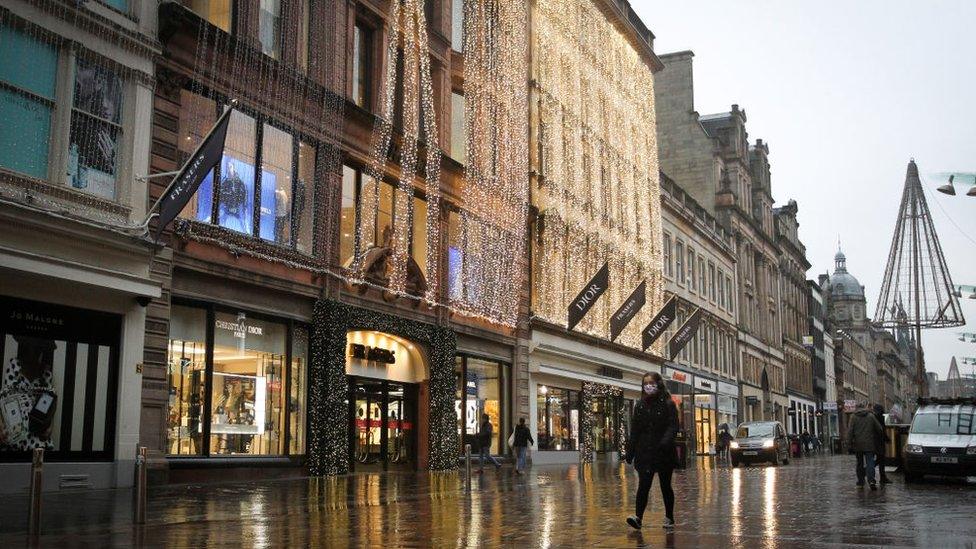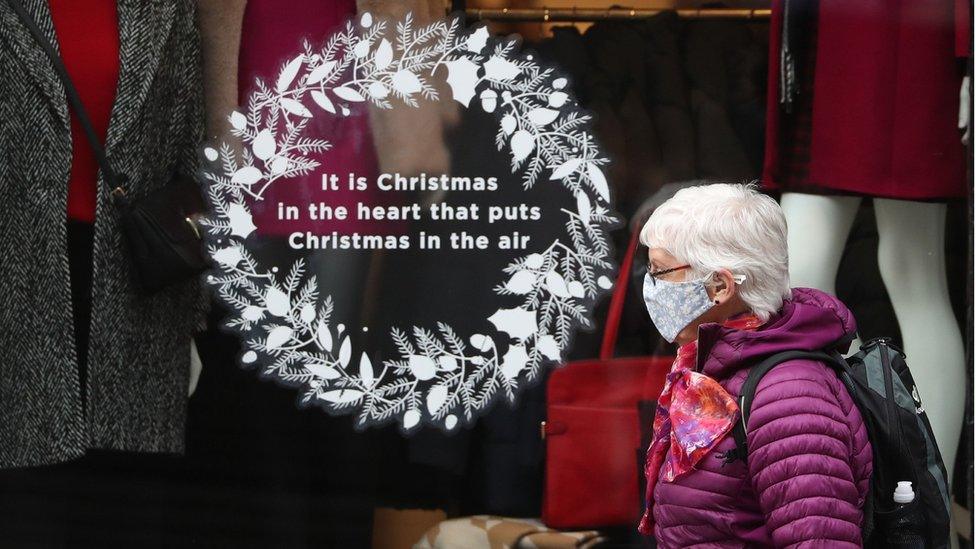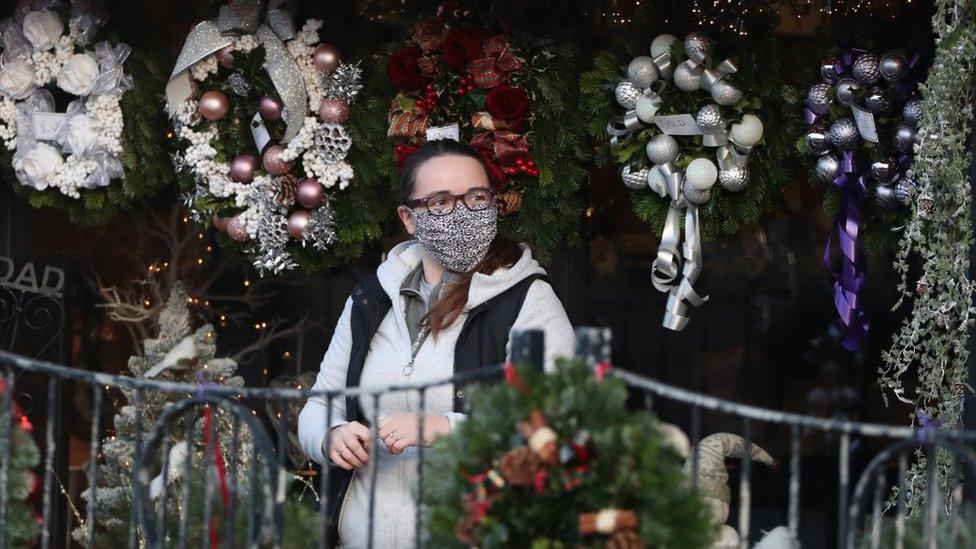Covid in Scotland: Businesses warn they need 'extraordinary' support
- Published
- comments

Business leaders have called for an "extraordinary" package of support to keep businesses afloat as Scotland faces a looming lockdown.
The Scottish Retail Consortium said closing shops could see retailers lose out on £135m per week in lost revenue.
Tourism and hospitality leaders warned more support was needed urgently for business and their supply chains.
One leading health expert, however, insisted the best way to help businesses was to "crunch" the virus.
Prof Devi Sridhar, of Edinburgh University, urged the rest of the UK to use Scotland's "harsh lockdown" as a model.
From Boxing Day, mainland Scotland will be under level four restrictions, external - which mean the closure of non-essential shops, pubs, restaurants and gyms - for at least three weeks.
The changes follow the revelation that a new strain of Covid could be 70% more transmissible than previous strains. , external
So far 17 cases of the new strain had been identified in Scotland through genomic sequencing, but public health officials believe this is an underestimate of its true prevalence.

The Scottish Tourism Alliance - in a letter to the first minister co-signed by the Scottish Chambers of Commerce, UKHospitality and Scotland Food & Drink - said it understood a "decisive response" was needed.
But chief executive Marc Crothall continued: "The ask of the industry is that the Scottish government now delivers a similarly swift and committed response to the economic consequences of this action."
He said much of the industry had already been "decimated" by the pandemic, and that for businesses to survive an "additional upweighted extraordinary package of funding must urgently be identified from within the Scottish and UK budgets".
Scottish Retail Consortium (SRC) director David Lonsdale earlier warned that the lockdown would come "slap bang in the middle of peak trading - which so many are depending on to power their recovery and tide them over".
"The government will need to offer additional financial support to help these businesses get back on an even keel," he added.
SRC data indicates that over recent months non-food stores are consistently trading about a fifth down on last year.
The retailers' trade association claimed many scientists thought closing non-essential retail would only have a "very minimal impact" on R values and reducing transmission of the virus.
David Lonsdale said shops needed "total clarity" on when they could reopen
Stephen Leckie, of the Scottish Tourism Alliance, told Good Morning Scotland closing hospitality again would have a knock-on impact to the supply chain, with Christmas food and drink orders being cancelled.
Mr Leckie, who owns the Crieff Hydro Hotel, said he now had to work out what he could offer guests on Christmas day, given that they would not be allowed to stay over on Christmas night.
"We had 30 or 40% bookings for the festive period about a month ago. That's dropped down to 10% now and we're likely to receive further cancellations this week if we remain open in any form."
Bubbles are 'no excuse to party'
Some of Scotland's leading health experts, meanwhile, have defended the strict measures as necessary to stop the new variant spreading rapidly.
National Clinical Director Prof Jason Leitch said that while people from three households would still be allowed to meet indoors for Christmas Day, people should think carefully about whether it was worth the risk.
Christmas bubbles should be used to "help with social isolation and caring" but not as an excuse to party at Christmas with people who you have missed, he said.
While three households will remain the legal maximum, the official recommendation is that you should only join up with one other household if it is essential in order to reduce loneliness and isolation.
Prof Leitch said the new and more transmissible strain of Covid appeared to have a higher reproduction rate than previous strains.
He said: "We think the R number for this version is 0.4 more than the R number for the other one if you just let it run wild.
"So imagine you have an R number right now of 0.9 - you think you are doing well, numbers are falling, everybody is transmitting to fewer than one other person, you are on the right path, then you get this dominant strain and your R number overnight goes to 1.3 and you get exponential growth and you are in big trouble."
'Crunch' down on virus
Prof Devi Sridhar, chairwoman of Global Public Health at Edinburgh University and a Scottish government adviser, said measures to "really crunch" down on the virus were the best way to help the economy.
"We have got to eliminate as much as possible to the lowest level of this virus because that is how we will reopen our economy," she told Sky News' Sophy Ridge on Sunday, external.
"Scotland was already running a lower infection rate but to go into quite a harsh lockdown over the holiday period, to extend the school holidays, to really try to get those numbers low, I think, I would hope the rest of the UK would follow that model, which is we have got to really crunch this."
Scotland's interim chief medical officer, Dr Gregor Smith, disclosed new details of why the new variant was able to spread more rapidly.
In response to a tweet asking if current hygiene advice was adequate, he replied: "From what we know so far, it appears that the mutations may allow it to bind to cells and gain entry more easily when we come into contact with it.
"But all the other advice on distancing, coverings and hand hygiene still stands and still offers protection."

VACCINE: When will Scots get it?
NUMBERS: Five key figures to watch out for
LOCKDOWN: Six months that changed our lives

- Published19 December 2020
